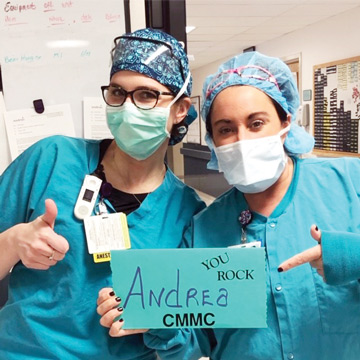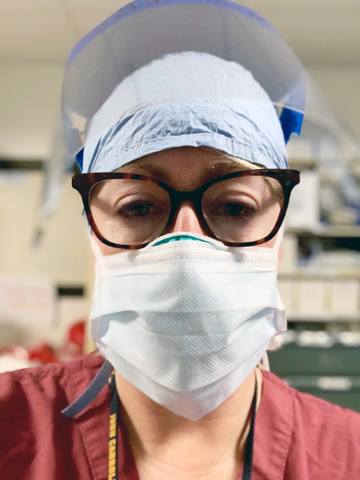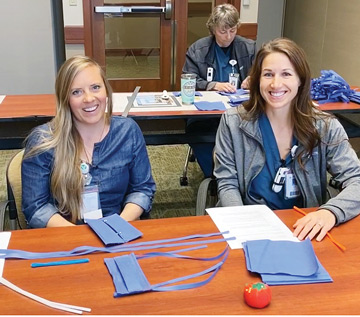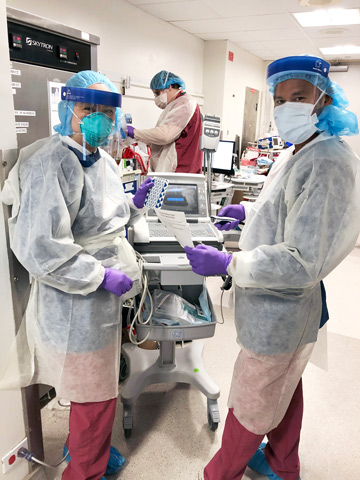Working in the ICU comes as a culture shock to surgical professionals who have grown accustomed to the immediate gratification of caring for patients where successful outcomes are the norm. "I was cleaning the bed of someone who had died, getting ready for the next patient and another chance," says Joana Borgonos, RN, pausing before finishing her thought. "That was a tough day."
It was the toughest of many tough days the operating room nurse at New York Presbyterian Morgan Stanley Children's Hospital in Manhattan has endured since trading in her scrubs for an isolation gown to help care for COVID-19 patients during this unprecedented worldwide pandemic. She helps administer medications, place feeding tubes and reposition patients, tasks she hasn't performed since nursing school. "It's sad to see patients who are very sick, but I'm glad to help," she says.
Ms. Borgonos is not used to working 12-hour shifts, which have been physically and mentally demanding. It's nearly impossible to stay hydrated or grab a quick bite to eat during the five hours between breaks when she's layered in a gown, N95 mask and full face shield. She never has two days off in a row. She works night shifts after day shifts. When she finally climbs into bed, rest is fitful. "It's hard for me to sleep," she says. "I wake up often knowing I have to be back at work in a few hours to do it all over again, to try to make it through the day without crying."
Ms. Borgonos has undergone two open heart surgeries to correct congenital abnormalities, the most recent two years ago. "My friends and family pleaded with me to take a leave of absence so I'm not exposed to the coronavirus, but I can't help myself," she says.
Her experience is unique, but not unusual. When the coronavirus shut down ORs across the country, thousands of surgical professionals rushed to the frontlines of the nationwide response to the outbreak. They volunteered to work at COVID-19 testing stations, teamed up with critical care nurses in hospital ICUs and pitched in wherever and whenever they were needed.
Their reasons for doing are based on the esoteric concept of a career calling seemingly predetermined by inherent compassion, virtue and guts. The straight shooters of the OR have a simpler view of what drives them to help heal a nation.
"My colleagues and patients need me," says Ms. Borgonos.
"Getting out would have been easy. Staying and doing as much as I can to help is the right thing to do."
Surgical nurse Megan Siddel, RN, ADN, could have stayed at home in Savannah, Ga., but knew she had to get to New York City and requested a travel assignment to NYU Langone Hospital-Brooklyn.
"It's a heartache," says Ms. Siddel, describing the visceral pull she felt to help. "It's impossible to sit back and watch people suffer when you have the skills to help make things better."
"It's impossible to sit back and watch people suffer when you have the skills to help make things better."
— Megan Siddel, RN, ADN
COVID-19 causes the lower lobes of the lungs to fill with mucus, preventing them from filling with oxygen, says Ms. Siddel. "It's a thick, tenacious mucus that can't be removed by suction," she says. "You're working to keep patients oxygenated and maintain functional heart rates and blood pressures throughout the shift."
Once patients are put on a ventilator, it's difficult to get them off. "The volume of death is indescribable," says Ms. Siddel.
She's been cheered by first responders when she's arrived for work and applauded by appreciative community members during the city's nightly salute to healthcare workers.
"This is the hardest and most rewarding thing I've ever done," says Ms. Siddel.
.svg?sfvrsn=be606e78_3)




.svg?sfvrsn=56b2f850_5)